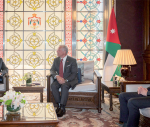You are here
Lebanon’s happy revolutionaries refuse to budge as protests persist
Nov 27,2019 - Last updated at Nov 27,2019
Thousands of Lebanese continue to protest in the streets and squares and outside key institutions throughout their country which they intend to reclaim from the grasping hands of the corrupt political elite. During six weeks of protests they have achieved some remarkable gains.
First and foremost, they have kept going. They have transformed a protest over taxation into an uprising against misrule, graft, shortage of water, electricity outages, poor public schools and health facilities, pollution and unemployment.
Within days, the uprising became a revolution aiming to overthrow the 1943 power-sharing National Pact which allocated state offices on a sectarian basis. They intend to accomplish this by forcing the adoption of a new electoral law and an election of deputies untainted by decades of misrule and graft.
By remaining peaceful and cheerful rather than adopting a violent and aggressive approach, the happy revolutionaries have compelled the security forces and army to handle them with kid gloves. So far, only one person has died at the hands of an officer of the state and the revolutionaries have refused to be provoked when attacked by violent thugs from Amal and Hizbollah, which seek to maintain the status quo.
The revolutionaries have united around a programme rather than leaders who could quarrel and compete for positions of power. Among the revolutionaries there are leaders of civil society groups and organisations but they have not tried, so far, to appropriate control. This has allowed the Lebanese to operate freely in their localities and shape their gatherings to local needs. Beirutis treat rallies as festivals of freedom. Conservative Tripoli in the north — where unemployment is 57 per cent — has become a protest hub while revolutionaries swell in numbers in equally conservative Sidon and Tyre in the south. All existing political parties and politicians are under challenge. The revolutionaries' slogan is, “All means all”.
They quickly tasted victory on October 18, hours after the protests began, when the tax on free WhatsApp calls — the casus belli — was cancelled and the Cabinet vowed no new taxes. This was followed by the resignations of four Cabinet ministers a few days later. Prime Minister Saad Hariri stepped down on the 29th but was reappointed caretaker until a new Cabinet could be formed. He pledged to form a Cabinet of technocrats if appointed by President Michel Aoun to head a new government. Aoun refused and former minister Muhammad Safadi from Tripoli was proposed to create a Cabinet comprised of politicians and technocrats. He stood down within 48 hours following mass rejection. Aoun has refused to budge, creating stalemate on this front.
The revolutionaries then blocked a parliamentary session set to debate an amnesty law for common crimes which could also be used to free from indictment politicians charged with corruption. A candidate backed by the revolutionaries won the election to the influential lawyers syndicate while professionals from other organisations and unions have begun to form alternatives to those beholden to the political elite. Politicians and officials have been hailed before anti-corruption judges.
The revolutionaries have closed schools, universities, banks and government offices. Petrol, medicines and imported foodstuffs are in short supply but they persist, putting pressure on the government to concede their demand for a government of experts. This demand has been supported by the Lebanese Forces, Hariri's Future Movement and the Druze community's Progressive Socialists, but rejected by Aoun's Free Patriotic Movement (FPM) and the Shiite Amal and Hizbollah which insist that the ministers of interior, finance, defence and foreign affairs must be veteran politicians who can set state policies in these spheres while others can be technocrats.
The three naysayers are determined to hang onto power at the expense of the country. Maronite Christian Aoun has no intention of leaving the presidential palace at Baabda. He was driven out in October 1990 by the Syrian army (with US approval) following 22 months in residence. He had been appointed prime minister by departing president Amin Gemayel although there was already a Cabinet headed by Selim Al Hoss, a clean technocrat. Gemayel's move constituted a violation of the National Pact which allocated the prime ministry to Sunnis, the presidency to Maronites, and the post of parliamentary speaker to Shittes. During his initial stay in the palace, Aoun ordered loyalist troops to wage war against opponents, killing at least 900. Aoun went into exile in France and returned in 2005 after Syrian troops withdrew from Lebanon.
The FPM, Hizbollah and Amal have too much at stake to capitulate to revolutionaries who want to abolish the sectarian system. The FPM is the largest Maronite party while the Shiite community Hizbollah and Amal represent, the largest in Lebanon, has been ruled for decades by feudalists and sidelined and ignored for decades. Hizbollah, in particular, rightly fears that under pressure from the US — which has branded and sanctioned the movement as "terrorist" — could be de-legitimised and lose the influence it has gained over past decades if a new system of governance is adopted.
Nevertheless, Maronites and Shiites have joined with Sunnis, Orthodox Christians, Armenians and Druze in a revolution against sectarianism meant to bring about a new, well managed, fairer Lebanon.













